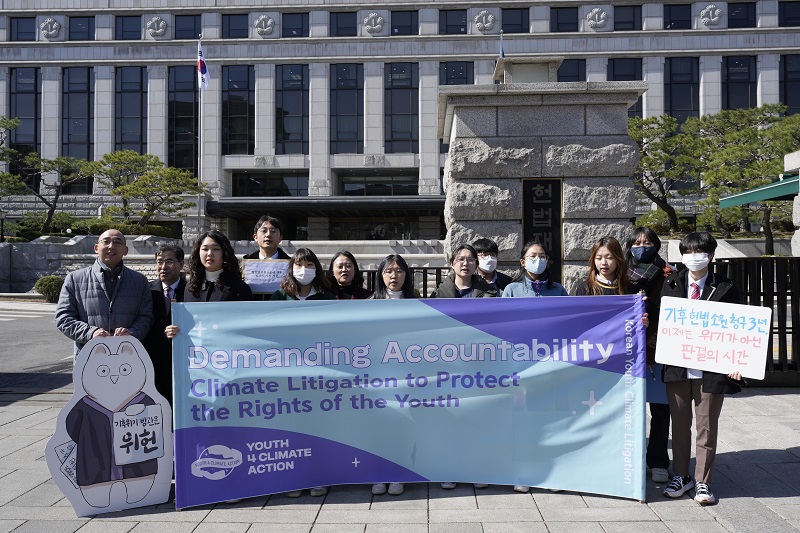Kim Seo-kyung was a teenager in March 2020, when she and 18 other members of campaign group Youth4ClimateAction filed the first climate lawsuit in Korea’s constitutional court, arguing that their government’s efforts to curb emissions fell far short of what was required.
Seo-kyung is now a 21-year-old adult but the court has still not made any decisions about the case. “As individuals, there is not much we can do that is different from before,” she told a press conference on Monday. “I earnestly hope that the constitutional court can play a role while there is still something that can be done.”
In the three years since the lawsuit was filed, the Korean government and the national assembly have announced a target to be carbon neutral by 2050, passed a climate change law and strengthened the country’s nationally determined contribution under the UNFCCC.
The government is currently working on its first detailed carbon neutrality strategy, as required by the legislation, which is expected to be published at the end of the month.
But campaigners are not satisfied. Climate Action Tracker deems the country’s progress “highly insufficient”, saying it lacks the necessary speed and stringency needed to be compatible with Paris Agreement’s 1.5°C temperature limit.
Most of Korea’s emissions come from the energy sector, which is highly dependent on fossil fuels for electricity generation. In 2021, the country was the third largest gas importer in the world, behind China and Japan.
Climate lawsuits
Youth4Climate’s petition in 2020 argued that the Korean government wasn’t doing enough to curb rising global temperatures and to protect their basic constitutional rights, including the right to life and pursuit of happiness, from the effects of climate change.
The group’s lawyers have sent ten further submissions to the constitutional court since, adding new information to their case. Among other things, they drew the court’s attention to landmark rulings in the Netherlands, Ireland, France, and Germany, all of which have recognised government responsibility to address climate change.
Yoon Se-jong, a lawyer for Plan 1.5 and one of the main legal representatives for the Youth4ClimateAction case, says German justices visited their Korean counterparts last November and climate litigation was one of the key topics under discussion.
A further three climate lawsuits have also been filed challenging the constitutionality of the government’s emission-cutting commitments. One, submitted last year, was fronted by a group of small children and what was then a 20-week-old foetus.
Swift ruling
Becoming increasingly frustrated at the court’s silence, Youth4ClimateAction campaigners delivered a letter earlier this week urging it to make a “swift ruling”, which was signed by more than 200 legal professionals from Korea and abroad.
Signatories included Baek Bum-seok, professor at Kyung Hee University and a UN Human Rights Council advisory member, and So Byung-cheon, president of the Korean Environmental Law Association and a professor at Ajou University Law School.
Legal professionals from France, the United Kingdom, the United States, the Netherlands, the Czech Republic and Nepal also voiced their support, including Roda Verheyen, a lawyer involved in Germany’s landmark climate lawsuit.
Sejong said the delay was understandable given the gravity of the issue and the implications the court’s decision could have on Korean policy and law. “But what we are really emphasising is that every month and year we lose is a lost opportunity for litigation that we really, really need. Leaving this question to the political process is not going to be enough.”
Chinese coal boom a ‘direct threat’ to 1.5C goal, analysts warn
Youth climate campaigners filing the case who had initially been buoyed up by the idea of taking legal action were despondent at the press conference.
“When I first learned about the enormous problem of climate change, I felt that I had to do something, and I participated in the climate lawsuit with the hope of making a practical change,” said Oh Min-seo, a 17-year-old from Chuncheon city.
“However, over the past three years, as I witnessed people dying in unprecedented floods and the Soyang River drying up due to the worst drought, my fears about climate change became more tangible, and the feeling of powerlessness has been accumulating in my heart because politics and law don’t seem to exist for our benefit.”
Their legal team seems more optimistic. Sejong noted that abortion was only decriminalised in Korea two years ago only after the constitutional court deemed it was infringing people’s rights.
‘Fundamental obligation’
In December, the National Human Rights Commission of Korea said the government had a “fundamental obligation” to protect human rights from the climate crisis and must actively respond to it. “It is necessary to set higher national greenhouse gas reduction targets and also to set reduction obligations for the post-2030 period to protect the basic rights of future generations,” it concluded.
Lucy Maxwell, co-representative of the Climate Litigation Network, noted that the lawsuit was the first of its kind in East Asia and said it offers “a really important opportunity to clarify the governmental obligations to protect constitutional rights in the face of the climate crisis”.
She said affected communities and even courts in other countries would be looking to the court for a judgment.
